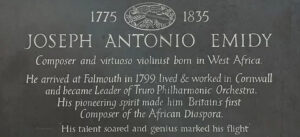 Joseph Emidy’s Memorial at the Seafarer’s Mission, Falmouth
Joseph Emidy’s Memorial at the Seafarer’s Mission, Falmouth
The fascinating story of Joseph Antonia Emidy has been mostly gleaned from the autobiography of one of his pupils, the Cornish-born politician and slavery abolitionist, James Silk Buckingham, who wrote about Emidy’s life up to 1807. Others have written about him, mostly using Buckingham’s material, and their work may provide a more comprehensive picture of this remarkable man than is possible in this short article.
From these accounts we know that Joseph was born in 1775, in Guinea, on the west coast of Africa.
At the age of 12 he was sold to Portuguese slavers. An abhorrent practice viewed through our 21st century eyes but a common occurrence in his time when slaves were valuable merchandise. He was transported to Brazil and sold to a slave master where he remained for a few years. It is suggested that it was here that he learnt to play the fiddle, possible taught by his slave master although he is also said to have been “Taught by Jesuit Priests”.
While still a young man, probably about 16 years old, we find him in Portugal where his master observed his musical talent and arranged for him to receive violin lessons. With instruction, he became a proficient violinist, good enough to gain a position with the Lisbon Opera.
We cannot be sure how long he held this position but it was brought to an abrupt end by the British Navy when in 1795, HMS Indefatigable under Sir Edward Pellew, put into Lisbon for repairs.
James Silk Buckingham wrote:
“While thus employed, it happened that Sir Edward Pellew, in his frigate the Indefatigable, visited the Tagus, and, with some of his officers, attended the opera. They had long wanted for the frigate a good violin player to furnish music for the sailors dancing in their evening leisure, a recreation highly favourable to the preservation of their good spirits and contentment. Sir Edward, observing the energy with which the young Negro plied his violin in the orchestra, conceived the idea of impressing him for the service. He accordingly instructed one of his lieutenants to take two or three of the boat’s crew, then waiting to convey the officers on board, and, watching the boy’s exit from the theatre, to kidnap him, violin and all, and take him off to the ship. This was done, and the next day the frigate sailed; so that all hope of his escape was vain. Poor Emidee was thus forced, against his will, to descend from the higher regions of the music in which he delightedly – Gluck, Hayden, Cimarrosa and Mozart, to desecrate his violin to hornpipes, jigs and reels, which he loathed and detested; and being, moreover, the only Negro on board, he had to mess by himself, and was looked down upon as an inferior being, except when playing to the sailors, when he was of course in high favour. As the captain and officers judged from his conduct and expressions that he was intensely disgusted with his present mode of life, and would escape at the first possible opportunity, he was never permitted to set foot on shore for seven long years [probably four years]. He was only released by Sir Edward Pellew being appointed to the command of a line-of-battle ship, L’impetueux, when he was permitted to leave in the harbour of Falmouth, where he first landed and remained, I believe, till the period of his death.”
In his book, Music in the West Country, Stephen Banfield questions Joseph Emidy’s place of birth and whether or not he was kidnapped by a press gang. He does say, however, that he was probably tricked into joining Pellew’s ship.
This latest experience of captivity lasted until 28th February 1799 when he was discharged at Falmouth where he chose to remain.
Now, having to earn a living, he began a musical career providing lessons, concerts and other musical events. An advertisement in the Royal Cornwall Gazette of the 7th August 1802 stated that he taught piano, cello, clarinet and flute as well as guitar and mandolin “in a most easy and elegant style”.
He was also the leader of the Falmouth Harmonic Society and had begun composing: his concerts included much of his wide-ranging work.
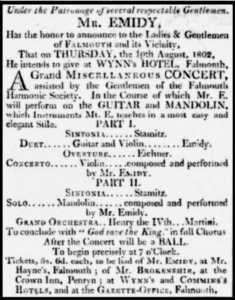 This advertisement, from the Royal Cornwall Gazette on the 7th August 1802, was one of many that appeared during his illustrious career. The programme included a violin concerto by Emidy.
This advertisement, from the Royal Cornwall Gazette on the 7th August 1802, was one of many that appeared during his illustrious career. The programme included a violin concerto by Emidy.
Joseph was probably making a reasonable living, good enough to consider marriage, and in September 1802, he married local girl, Jenefer Hutchins, the daughter of a local tradesman. In July of the following year, Jenefer gave birth to their first son, Joseph.
In 1804, Flushing born James Silk Buckingham began taking flute lessons with Emidy. Perhaps Buckingham’s love of learning the flute could be explained by his comment:
“… finding it a most agreeable recommendation in female society, of which I was always fond.”
Of Joseph he wrote:
“An African Negro, named Emidee, who was a general proficient in the art, an exquisite violinist, a good composer, who led at all the concerts of the county and who taught equally well the piano, violin, violoncello, clarionet, and flute.”
Buckingham had remarked that Emidy played to a degree of perfection never before heard in Cornwall and this ability also impressed a later admirer, William Tuck, who came into contact with the composer as a member of the Camborne Harmonic Society.
“This predilection (for music) was evinced at Camborne in my early youth when a few gentlemen combined to meet for musical study and recreation once a fortnight, and engaged a professional from Truro as teacher. This preceptor was a Mr Emidy, an African Negro. This remarkable man was the most finished musician I ever heard of, though I have had the privilege of listening to most of the stars who have appeared on the London stage during the past 50 years, but not one of them in my estimation have equalled this unknown Negro. He was not only a wonderful manipulator on the violin, cello or Viola, but could write fluently in either of these clefs; his hands seemed especially adapted for the work, his extremely long, thin fingers were not much larger than a goose quill: where this great talent came from was always a mystery to me, and to all who came in contact with him.”
Truro’s first Biennial Concert and Ball was held in 1804 and Emidy took part in it. He was also involved in the second, in 1806. The programme for Truro’s third biennial concert, in 1808, included overtures by Handel and Martini and a violin concerto by Emidy himself.
Joseph and Jenefer’s second son, Thomas, was born in July 1805. He became a composer and leader of a quadrille band. A further son, James, was born in 1808 and one report suggests that they had a total of eight children.
The reputation of the black slave musician spread beyond Cornwall thanks to the efforts of James Silk Buckingham, who took some of Joseph’s compositions to London where they were well-received.
James Silk Buckingham wrote:
“Emidee had composed many instrumental pieces, such as quartetts, quintetts and symphonies for full orchestra, which have been played at the provincial concerts and were much admired. On my first leaving Falmouth to come to London – about 1807 – I brought with me several of these pieces in manuscript, to submit them to the judgement of London musical professors, in order to ascertain their opinion of their merits. At that period, Mr Salomon’s (sic) the well-known arranger of Haydn’s symphonies as quintett, was the principal leader of the fashionable concerts at the Hanover square rooms. I sought an interview with him, and was very courteously received. I told him the story of Emidee’s life, and asked him to get some of his pieces tried. This he promised to do, and soon after I received an intimation from him that he had arranged a party of professional performers, to meet on a certain day and hour at the shop of Mr Betts, a musical instrument maker, under the piazza of the Royal Exchange, where I repaired at the appointed time, and in an upper room a quartett, a quintett, and two symphonies with full complement were tried, and all were highly approved. Though Salomon was sufficiently impressed to suggest that Emidee should come to London to give a concert of his works, others felt his colour would be so much against him, that there would be a great risk of failure: and that it would be a pity to take him from a sphere in which he was now making a handsome livelihood and enjoying a high reputation, on the risk of so uncertain a speculation.”
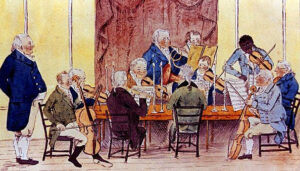 A print from a painting entitled A Musical Club showing Joseph Emidy playing violin in November 1808, in the Concert Room of Truro’s Assembly Building
A print from a painting entitled A Musical Club showing Joseph Emidy playing violin in November 1808, in the Concert Room of Truro’s Assembly Building
The Royal Cornwall Gazette in June 1810 provided a glowing report of a concert performance of his music with equal acclamation for its composition and its execution. Such reports were becoming increasingly frequent.
By 1812, Joseph and Jenefer had a growing family and they decided to leave Falmouth and move to Truro where Joseph became the leader of the Truro Philharmonic Society – from 1816 to 1826.
His advertisement in the West Briton of December 1820:
“Violin, Tenor, Bass-Viol, Guitar, and Spanish Guitar taught, balls and assemblies attended, harps tuned and piano-fortes buffed, regulated and tuned.”
His Concerto for French Horn was played in a concert in December 1821 by the Royal Cornwall Band but now, two hundred years later, we are left to wonder what a gem of the musical world this probably was.
There remain many reports of his prowess. His reputation as a teacher, performer and composer continued to spread and he was in great demand across Cornwall. In 1824 the West Briton reported his involvement in forming an orchestra in Helston. In addition to his work in Truro, Falmouth and Helston, he had connections with Lostwithiel and Bodmin.
On the 2nd April 1828 the Royal Cornwall Gazette announced:
“We understand that Mr Emidy, the leader of our Philharmonic Society, has lately employed his talents in a rather novel manner for a professor of the violin, and has produced some Variations on the subject of a Grecian Aire for the pianoforte, which evince not only a correct taste but considerable judgment, as regards the nature of the latter instrument. The production has been submitted to the inspection of competent judges, and highly commended. It is intended to publish it by subscription.”
Joseph died on the 23rd April 1835 and is buried in Kenwyn Churchyard, in Truro. His obituary in the West Briton referred to his talents as being of the first order and his sinfonias as evincing not only deep musical research, but also those flights of genius.
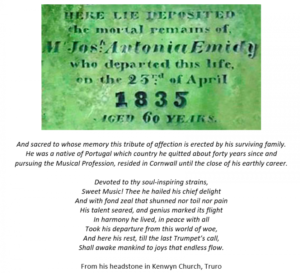
Following Joseph’s death, the local papers carried these obituaries.
The Royal Cornwall Gazette on the 25th April 1835:
“His talents may be said to have ranked under the first order while his enthusiastic devotedness to the science has rarely been exceeded. As an orchestral composer his sinfonias may be mentioned as evincing not only deep musical research, but also those flights of genius which induce regret that his talents were not called into action in a more genial sphere than that in which he has moved.”
The West Briton on the 1st May 1835:
“His talents as a musician were of the first order and he was enthusiastically devoted to the science.”
The Royal Cornwall Gazette on Saturday the 16th May 1835:
“The lovers of music, we are grateful to find, intend to evince their appreciation of the long and unwearied public service of the late Mr Emidy by their patronage of a musical performance, on an extended scale, at the Assembly Room on the 27th instant for the benefit of his widow and family. This is, as far as departed talent is concerned, as it should be; we cannot, however, refrain from adding our wishes that its existing possessors were sufficiently rewarded to render such appeals to public benevolence unnecessary.”
The Royal Cornwall Gazette on Saturday the 23rd May 1835:
“The concert for the benefit of the widow and family of the late Mr Emidy takes place on Wednesday next… The selection of music announced for the evening entertainment is good… It is to be hoped that the attendance on the occasion will be numerous.”
Later in the year, on Friday the 30th October 1835, the Royal Cornwall Gazette included this notice:
“For the benefit of the widow of the late Mr Emidy. The public are most respectfully informed that on Friday, the 6th of November, there will be given at the assembly rooms, Pierce’s Hotel, Falmouth, a grand concert of vocal and instrumental music, on which occasion the orchestra will be complete. In soliciting the kind patronage of the gentry and public of her native town, Mrs Emidy takes the opportunity of returning her sincere and grateful thanks for the continued favour bestowed on her late husband during a period of nearly 35 years. On the present occasion she most humbly and treats that kind support which may in some degree alleviate her recent bereavement. Mrs Emidy likewise begs to inform the ladies and gentlemen of Falmouth that her son, William, has taken lessons on tuning the piano forte and is fully competent to take his father’s place in that department. Of his ability, Mrs Emidy, with due deference, hopes that those ladies and gentlemen who employed his father may make a trial.”
Joseph’s compositions were of sufficient quality for James Silk Buckingham to describe them as “… an achievement of extraordinary perfection”. Unfortunately though, none of them have ever been found and there seems little hope that we will have the pleasure of ever hearing them. There are those however, including music expert Gareth Henderson, who believe that his manuscripts still exist. Perhaps they do, in a cupboard or in an attic, and one day they will find their way to the music stands. We can but hope.
Joseph’s memory lives on
In 1998, the Hidden Routes Concert in Truro Cathedral commemorated Emidy’s life. The second half was dedicated to Joseph Emidy – an African in Cornwall.
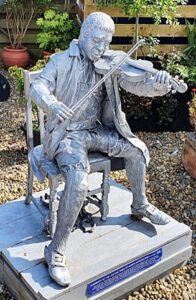 Joseph Emidy’s Statue at Falmouth Church
Joseph Emidy’s Statue at Falmouth Church
Cornish playwright, Alan Kent, portrayed Emidy in his play, The Tin Violin, and BishBashBosh Productions and the Kneehigh Theatre have performed it.
In 2015, Peter Boex of Wendron carved The Joseph Emidy boss which is now affixed to the ceiling of St Mary’s Aisle in Truro Cathedral: it depicts a violin and a map of Africa. It was dedicated at a service which included Truro Cathedral Choir and music played on the kora, a string instrument from West Africa.
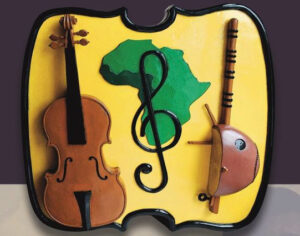
Joseph’s musical talents did not die with him. His son, Thomas Hutchins Emidy, was the Musical Director of Truro Brass Band from the 1840s, until his death in 1871. So well-known was he that the band was often referred to as “Emidy’s Band”.
References:
Information for this brief biography has been drawn from various sources, mainly, as has been stated, from James Silk Buckingham but also from papers and articles by Bernard Deacon, Dr Richard McGrady’s (An African in Cornwall), Jon Rose (The Emidy Violin Concerto) and Matthew Spriggs of the Department of Prehistory of the Australia National University.
Kresen Kernow Reference 788-25
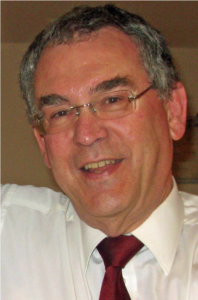
Tony Mansell is the author of several books on aspects of Cornish history. In 2011 he was made a Bardh Kernow (Cornish Bard) for his writing and research, taking the name of Skrifer Istori. He has a wide interest in Cornish history and is a researcher with the Cornish National Music Archive and a sub-editor with Cornish Story: an Institute of Cornish Studies initiative.

The Boss in Truro Cathedral was organised, designed and funded by Galina Chester. It also displays a Treble Clef and Kora.